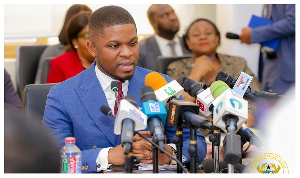Like other governments around the world, Ghana, since the inception of the Sustainable Development Goals (SDGs) 2030 in September 2015, has taken actions to further the agenda 2030 and ensure that the targets will be met within the stipulated time frame.
However, initial assessment shows that the rate of progress is slower than is required to achieve the SDGs, Minister for Planning, Professor George Gyan-Baffour has disclosed.
He was speaking at the launch of Ghana’s SDGs Indicator Baseline Report held in Accra today.
The report, which is the first for the SDGs era and follows on from Ghana’s final MDGs report in 2015 provides the baseline status for a set of 56 SDGs indicators and also serves as a reference point for monitoring and tracking progress towards achieving the SDGs as well as the corresponding African Union’s agenda 2063.
The country moving at a slow pace includes the sluggish progress in poverty reduction which has not been even across the country. The three Northern Regions still have the highest depth of poverty while the Western, Central, Volta and Ashanti regions have seen their poverty deepened between 2006 and 2013.
Reports revealed that about 28.3% of all children are estimated to be living in poverty, and 10% in extreme poverty, deprived of crucial aspects of their lives such as nutrition, health, water, education or shelter.
Another peculiar case is the annual growth of GDP per capita which has consistently declined after peaking at 11.3% in 2011 to 1.3% in 2016.
It has also been estimated that youth unemployment rates which recorded 14.4% in the year 2015 is more than double the overall unemployment rates which stands at 6.5% especially with the recent sacking of over 1000 staff of some five banks which were dissolved by the Bank of Ghana.
According to Prof Gyan- Baffour although the implementation of the SDGs has support from the high office, he urged stakeholders to capitalize on working together as a team to ensure Ghana attains all of the SDGs by 2030.
“We must all therefore join forces and evolve innovative ways to accelerate progress towards realizing the agenda,” he posited.
To promote intra and inter-sectorial collaboration, he said a 3-tier committee coordination structure has been thus set up hasten the process.
The Minister, however, mentioned that government has taken the necessary steps to incorporate the goals and targets of the SDGs and the African Union Agenda 2063 at all the stages with planning and budgeting process.
In attendance were the SDGs Special Advisor to the Presidency, Dr. Eugene Owusu; Chief Executive Officer (CEO) of the Private Enterprise Federation, Nana Osei Bonsu, Deputy Director of the National Development Planning Commission (NDPC) Dr. Felix Addo-Yobo among other stakeholders.
General News of Thursday, 6 September 2018
Source: www.ghanaweb.com













